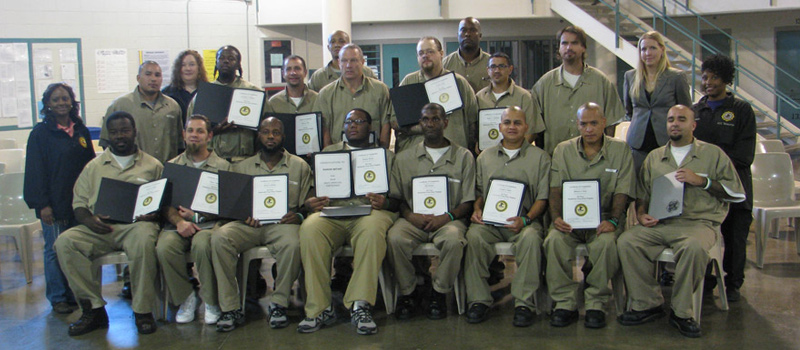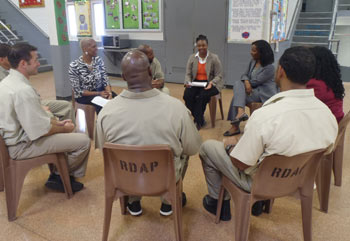Substance Abuse Treatment
For over twenty years, the Bureau's substance abuse treatment strategy has made a significant difference in the lives of inmates, their families, and their communities.

The Bureau's drug abuse treatment strategy has grown and changed as advances have occurred in substance treatment programs. Staff members have maintained their expertise in treatment programming by monitoring and incorporating improvements in the treatment and correctional programs literature, research, and effective evidence-based practices.
Drug treatment studies for in-prison populations find that when programs are well-designed, carefully implemented, and utilize effective practices they:
- reduce relapse
- reduce criminality
- reduce recidivism
- reduce inmate misconduct
- increase the level of the offender's stake in societal norms
- increase levels of education and employment upon return to the community
- improve health and mental health symptoms and conditions
- improve relationships
Collectively, these outcomes represent enormous safety and economic benefits to the public.
Drug Abuse Education
This series of classes provides education regarding substance abuse and its effects, and serves to help identify offenders with a need for further programming.
Nonresidential Drug Abuse Treatment
This 12-week, Cognitive-Behavioral Therapy (CBT) treatment program is conducted primarily in a group setting. The content address criminal lifestyles and provides skill-building opportunities in the areas of rational thinking, communication skills, and institution/community adjustment. This program is for offenders who:
- have short sentences
- may not meet the criteria for the Residential Drug Abuse Program (RDAP)
- are awaiting RDAP
- are transitioning to the community
- have had a positive urinalysis test
Residential Drug Abuse Program (RDAP)
 RDAP is the Bureau's most intensive treatment program. CBT is used in a modified
therapeutic community model where offenders experience living in a pro-social community. Offenders live in a
unit separate from general population; they participate in half-day programming and half-day work, school, or
vocational activities. RDAP is typically nine months in duration.
RDAP is the Bureau's most intensive treatment program. CBT is used in a modified
therapeutic community model where offenders experience living in a pro-social community. Offenders live in a
unit separate from general population; they participate in half-day programming and half-day work, school, or
vocational activities. RDAP is typically nine months in duration.
The Bureau and National Institute on Drug Abuse combined funding and expertise to conduct a rigorous analysis of the Bureau's RDAP. Research findings demonstrated that RDAP participants are significantly less likely to recidivate and less likely to relapse to drug use than non-participants. The studies also suggest that the Bureau's RDAPs make a significant difference in the lives of offenders following their release from custody and return to the community.
Community Treatment Services (CTS)
A part of the Community Reentry Affairs Branch of the Reentry Services Division, Community Treatment Services provides important support services to individuals transitioning from incarceration to community placement. Formerly known as Transitional Drug Abuse Treatment (TDAT), CTS provides continuity of care for offenders placed in Residential Reentry Centers (RRCs), Day Reporting Centers (DRCs), home confinement (HC), and on federal location monitoring (FLM).
Research indicates that individuals are most vulnerable when initially returning to the community after a period of incarceration, placing an individual at a significant risk for relapse and recidivism. Continued treatment and support services as well as supervision are essential elements to an individual's reentry success.
CTS provides a comprehensive network of contracted, community-based treatment providers in all 50 states, three U.S. Territories, and the District of Columbia. The network of professionals consists of licensed individuals (e.g., certified addictions counselors, psychologists, psychiatrists, social workers, professional counselors, medical doctors, certified sex offender therapists, etc.) and specialized agencies resulting in a variety of services available in the community. In addition to providing treatment services to RDAP participants, services also include treatment for individuals with mental health disorders, sex offenses, medication assisted treatment (MAT), peer support, as well as family counseling. Moreover, services such as crisis intervention counseling for PREA incidents, situational depression, grief/loss, adjustment issues, anxiety, and enhanced treatment services for non-RDAP offenders who receive a substance use related incident report while in the community are available as needed.
Finally, CTS employees work closely with U.S. Probation and Court Services and Offender Supervision Agency (CSOSA) to establish a continuum of care as the offender leaves Bureau custody and transitions to a term of supervision. To facilitate this process, the supervising agency is provided with a comprehensive termination report for all individuals who have participated in community treatment. This provides the supervising officer valuable information regarding the individual's treatment progress and ongoing treatment needs.
Our treatment strategy will continue to evolve
Over the last twenty years, the Bureau has maintained a commitment to cognitive behavioral treatment: focusing offenders on understanding the relationships between their thoughts, feelings and behaviors. By doing so, offenders can learn to identify patterns of thinking that lead to self-destructive actions and beliefs, so they can improve their coping skills. The Bureau also continues to adopt changes in treatment methods in an ongoing effort to improve treatment outcomes, such as transitioning programs from didactic (classroom instructive sessions) to interactive (group treatment sessions). The BOP's drug treatment programs have recently undergone expansion to provide treatment opportunities for mentally ill offenders, and offenders who are U.S. citizens who speak only Spanish. The Bureau will continue to refine its programming efforts to maximize the likelihood of a successful return to the community for releasing ex-offenders and to ensure the public is best protected.